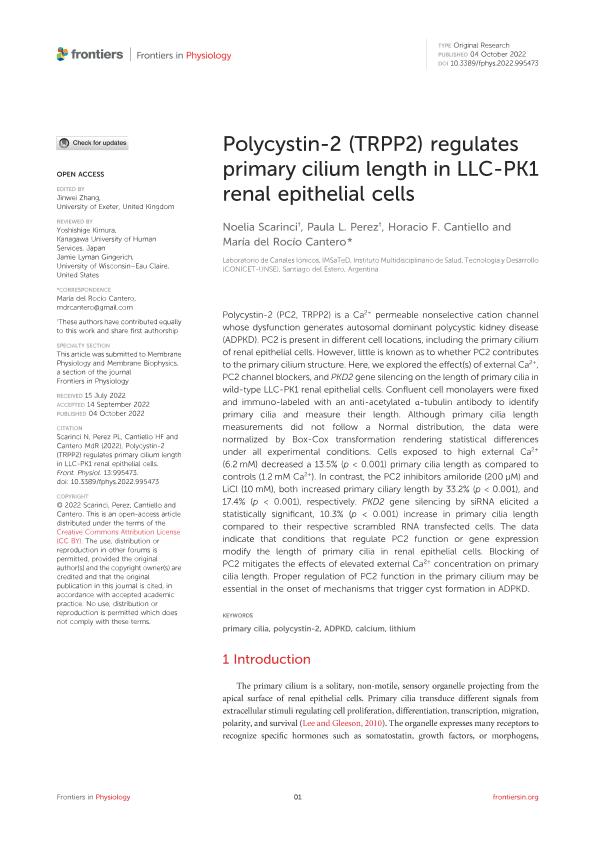Artículo
Polycystin-2 (TRPP2) regulates primary cilium length in LLC-PK1 renal epithelial cells
Fecha de publicación:
09/2022
Editorial:
Frontiers Media
Revista:
Frontiers in Physiology
e-ISSN:
1664-042X
Idioma:
Inglés
Tipo de recurso:
Artículo publicado
Clasificación temática:
Resumen
Polycystin-2 (PC2, TRPP2) is a Ca2+ permeable nonselective cation channel whose dysfunction generates autosomal dominant polycystic kidney disease (ADPKD). PC2 is present in different cell locations, including the primary cilium of renal epithelial cells. However, little is known as to whether PC2 contributes to the primary cilium structure. Here, we explored the effect(s) of external Ca2+, PC2 channel blockers, and PKD2 gene silencing on the length of primary cilia in wild-type LLC-PK1 renal epithelial cells. Confluent cell monolayers were fixed and immuno-labeled with an anti-acetylated α-tubulin antibody to identify primary cilia and measure their length. Although primary cilia length measurements did not follow a Normal distribution, the data were normalized by Box-Cox transformation rendering statistical differences under all experimental conditions. Cells exposed to high external Ca2+ (6.2 mM) decreased a 13.5% (p < 0.001) primary cilia length as compared to controls (1.2 mM Ca2+). In contrast, the PC2 inhibitors amiloride (200 μM) and LiCl (10 mM), both increased primary ciliary length by 33.2% (p < 0.001), and 17.4% (p < 0.001), respectively. PKD2 gene silencing by siRNA elicited a statistically significant, 10.3% (p < 0.001) increase in primary cilia length compared to their respective scrambled RNA transfected cells. The data indicate that conditions that regulate PC2 function or gene expression modify the length of primary cilia in renal epithelial cells. Blocking of PC2 mitigates the effects of elevated external Ca2+ concentration on primary cilia length. Proper regulation of PC2 function in the primary cilium may be essential in the onset of mechanisms that trigger cyst formation in ADPKD.
Palabras clave:
ADPKD
,
CALCIUM
,
LITHIUM
,
POLYCYSTIN-2
,
PRIMARY CILIA
Archivos asociados
Licencia
Identificadores
Colecciones
Articulos (IMSATED)
Articulos de INSTITUTO MULTIDISCIPLINARIO DE SALUD, TECNOLOGIA Y DESARROLLO
Articulos de INSTITUTO MULTIDISCIPLINARIO DE SALUD, TECNOLOGIA Y DESARROLLO
Citación
Scarinci, María Noelia; Pérez, Paula Luciana; Cantiello, Horacio Fabio; Cantero, Maria del Rocio; Polycystin-2 (TRPP2) regulates primary cilium length in LLC-PK1 renal epithelial cells; Frontiers Media; Frontiers in Physiology; 13; 9-2022; 1-13
Compartir
Altmétricas




